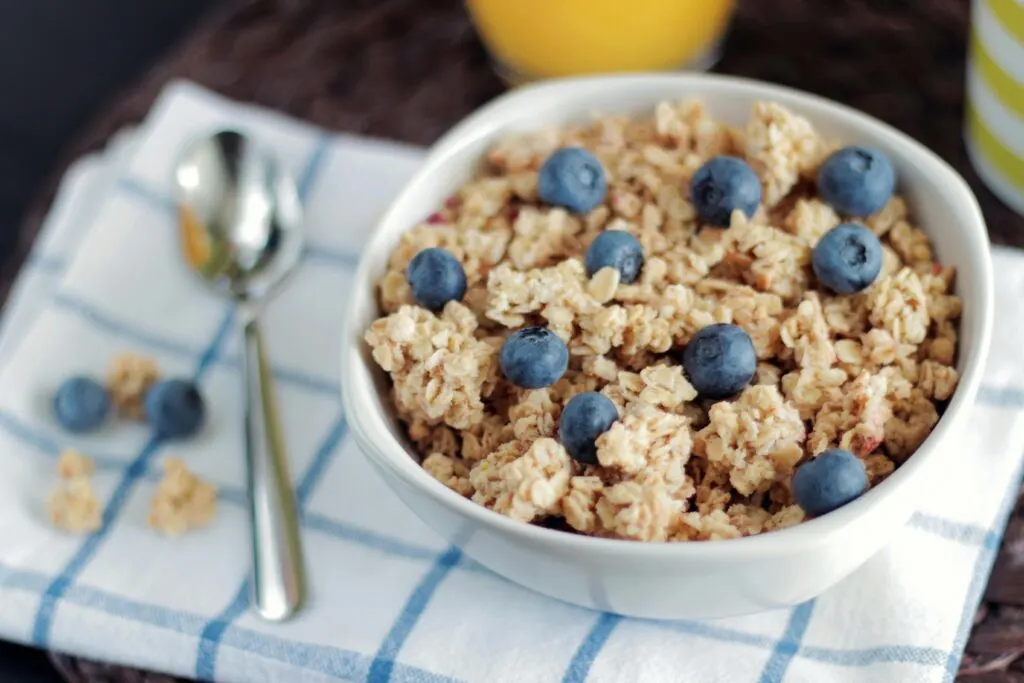Oatmeal, the breakfast champion! It’s warm, comforting, and packed with nutrition. But for some, a bowl of oats can come with an unexpected side effect: gas. Does oatmeal cause gas, and if so, what can you do about it?

The Nutritional Benefits of Oatmeal
Oatmeal is a breakfast staple enjoyed by people worldwide. But beyond its comforting warmth and versatility, oatmeal packs a powerful punch of nutritional benefits. Let’s delve into the reasons why oatmeal deserves a regular spot on your plate:
1. Fiber Powerhouse: Oatmeal is a champion of fiber, particularly the soluble fiber beta-glucan. This mighty fiber slows down digestion, keeping you feeling fuller for longer and promoting gut health. Beta-glucan also helps lower cholesterol levels and regulate blood sugar, making it beneficial for heart health and diabetes management.
2. Vitamin and Mineral Bounty: Oatmeal is a treasure trove of essential vitamins and minerals. It’s an excellent source of manganese, phosphorus, magnesium, copper, iron, zinc, folate, vitamin B1 (thiamin), and vitamin B5 (pantothenic acid). These nutrients play crucial roles in energy production, metabolism, bone health, immunity, and nervous system function.
3. Antioxidant Shield: Oats are naturally rich in antioxidants, including avenanthramides, which are unique to this whole grain. These antioxidants combat free radical damage, reducing the risk of chronic diseases like heart disease, cancer, and Alzheimer’s.
4. Weight Management Friend: The high fiber content of oatmeal makes you feel full and satisfied.
5. Gut Health Hero: The soluble fiber in oatmeal nourishes beneficial gut bacteria, promoting a healthy gut microbiome. This strengthens the immune system and improves digestion.
6. Skin Soother: Oatmeal’s anti-inflammatory properties extend to the skin. Colloidal oatmeal, finely ground oats, is often used in skincare products to soothe irritation, itching, and dryness.
7. Budget-Friendly Goodness: Oatmeal is an incredibly affordable food, making it a budget-friendly way to boost your nutrition.
8. Versatility Champion: Oatmeal’s blank canvas versatility is another bonus. You can enjoy it savory or sweet, hot or cold. Add nuts, seeds, fruits, spices, or even vegetables to create endless flavor combinations that keep your taste buds happy.
Can Eating Oats Every Day Cause Gas?
Eating oats every day can cause gas in some people. This is because oats are a good source of fiber, which is beneficial for digestion and gut health. However, certain types of fiber, like the beta-glucan found in oats, can be fermented by gut bacteria, producing gas as a byproduct.
Here’s a breakdown of why oats might cause gas and what you can do about it:
Reasons why oats might cause gas:
High fiber content: As mentioned, oats are high in fiber, which can be difficult for some people to digest. This can lead to gas, bloating, and discomfort.
Gut bacteria: The type and amount of bacteria in your gut can also play a role. If you have a higher level of certain gut bacteria that ferment oats, you’re more likely to experience gas.
Sudden increase in fiber intake: If you’re not used to eating a lot of fiber, adding oats to your daily diet can cause your gut to adjust, leading to temporary gas and bloating.
Other ingredients: Depending on how you prepare your oats, adding certain ingredients like dairy, fruits, or nuts can also contribute to gas production.
What you can do to minimize gas:
Start slow: If you’re new to oats, increase your intake gradually to allow your gut to adjust. Begin with a small amount, like 1/4 cup, and slowly increase over time.
Soak your oats: Soaking your oats overnight can help break down some of the fiber, making them easier to digest.
Choose quick-cooking oats: These oats are partially pre-cooked, which makes them easier to digest and less likely to cause gas.
Pair oats with protein and healthy fats: These nutrients can help slow down digestion and reduce gas production.
Identify trigger ingredients: Pay attention to how you feel after eating different types of oats and with different additions. This can help you identify any specific ingredients that might be causing gas for you.
Consider digestive enzymes: Taking over-the-counter digestive enzymes with beta-glucanase can help break down the fiber in oats and reduce gas.
Foods That Pair Well with Oatmeal for Improved Digestion
While oatmeal is a nutritional powerhouse on its own, pairing it with certain foods can further enhance its gut-friendly goodness and improve your overall digestion.
1. Fruits:
Berries: Blueberries, raspberries, strawberries, and blackberries are packed with fiber and antioxidants, promoting a healthy gut microbiome.
Bananas: These creamy fruits are a good source of prebiotics, which feed your gut bacteria and aid digestion. They also add a natural sweetness and potassium boost to your oatmeal.
Apples: Chopped apples add a delightful crunch and fiber to your oatmeal. They also contain pectin, a soluble fiber that helps regulate digestion.
2. Vegetables:
Pumpkin seeds: These tiny seeds are rich in zinc, magnesium, and healthy fats, contributing to gut health and digestion.
Chia seeds: Packed with fiber and omega-3 fatty acids, chia seeds promote gut health and regularity. They also have a mild nutty flavor and gel when soaked.
Spinach: This leafy green is a great source of iron, folate, and vitamins A and C.
3. Nuts and Seeds:
Almonds: Chopped almonds add a rich, nutty flavor and healthy fats to your oatmeal. They also contain fiber and prebiotics, benefiting gut health.
Walnuts: Rich in omega-3 fatty acids and fiber, walnuts promote gut health and digestion.
Flaxseeds: These tiny seeds are loaded with fiber, omega-3 fatty acids, and lignans, which contribute to gut health and digestion.
4. Spices:
Cinnamon: This warm spice adds a delightful flavor and aroma to your oatmeal.
Ginger: This versatile spice has a warming and slightly sweet flavor that pairs well with oatmeal.
Cardamom: This aromatic spice adds a unique flavor and warmth to your oatmeal.
5. Probiotic Yogurt:
Topping your oatmeal with a dollop of plain probiotic yogurt adds a creamy texture and a boost of gut-friendly bacteria. Choose yogurt with live and active cultures.

When to Avoid Eating Oatmeal for Optimal Digestive Health
While oatmeal is a nutritional powerhouse generally good for digestion, there are some situations where it might be best to avoid it for optimal gut health.
1. Irritable Bowel Syndrome (IBS):
If you have IBS, especially with a dominant digestive problem of bloating and gas, oatmeal’s high fiber content, particularly the beta-glucan, can aggravate your symptoms. The fermentation process by gut bacteria can produce excess gas, leading to discomfort.
2. Celiac Disease or Gluten Sensitivity:
Oatmeal is naturally gluten-free, but it can be contaminated with gluten during processing or packaging if grown or processed alongside wheat, barley, or rye.
3. Fructose Intolerance:
Some oatmeal varieties, especially flavored ones, may contain added sugars like fructose. If you have fructose intolerance, consuming these oats can lead to bloating, gas, diarrhea, and abdominal cramps due to difficulty digesting the sugar.
4. Recent Gastrointestinal Surgery or Inflammation:
Following gastrointestinal surgery or during an episode of gut inflammation, your digestive system might be more sensitive to fiber. In such cases, it’s best to avoid oatmeal temporarily and gradually reintroduce it later as your gut heals.
5. Personal Digestive Intolerance:
Even without diagnosed conditions, some individuals might experience bloating, gas, or discomfort after eating oatmeal.
Alternatives to Oatmeal for Gut Health:
If you need to avoid oatmeal for digestive reasons, there are plenty of other gut-friendly options:
Rice porridge: A gentle and easily digestible alternative with less fiber than oatmeal.
Chia pudding: Rich in fiber and omega-3 fatty acids, chia seeds absorb liquid and create a pudding-like consistency.
Yogurt with fruit and nuts: A probiotic and protein-rich combination.
Scrambled eggs with vegetables: A protein-packed option with minimal fiber content.
Remember, consulting a healthcare professional or registered dietitian is always recommended for personalized dietary advice.
When to Seek Medical Attention for Chronic Gas and Bloating Issues
Chronic gas and bloating can be uncomfortable and disruptive to daily life. While occasional digestive disturbances are normal, it’s important to know when to seek medical attention, as these symptoms can sometimes indicate underlying health conditions. Here are some red flags to watch out for:
Seek medical attention if you experience:
Persistent or severe bloating or abdominal pain: Bloating that lasts for weeks or significantly interferes with your daily activities warrants a doctor’s visit.
Sudden onset of severe pain: Sudden and intense abdominal pain, especially if accompanied by other symptoms like fever, vomiting, or blood in stool, requires immediate medical attention.
Changes in bowel habits: Significant changes in bowel movements, such as constipation, diarrhea, or changes in stool consistency or color, can be concerning.
Unexplained weight loss: Unintentional weight loss, especially without trying or alongside other symptoms, can be a sign of a serious medical condition.
Fever or vomiting: These symptoms in conjunction with bloating or abdominal pain can indicate an infection or other digestive issues.
Blood in stool: Blood in stool, whether bright red or dark maroon, is a warning sign and should be evaluated by a doctor immediately.
Additional factors to consider:
Your age: If you’re over 50 and develop new-onset digestive symptoms, it’s best to get checked out.
Family history: Having a family history of certain digestive conditions like Crohn’s disease or ulcerative colitis increases your risk and warrants closer monitoring.
Previous surgeries or medical conditions: Certain medical conditions or previous abdominal surgeries can put you at higher risk for digestive issues.
Remember, this is not an exhaustive list, and it’s always best to err on the side of caution and consult a doctor if you have any concerns about your digestive health.

Frequently Asked Questions (FAQs)
To prevent gas after eating oatmeal, try soaking the oats before cooking to break down hard-to-digest fibers, eating smaller portions, and gradually increasing your fiber intake to let your body adjust. Additionally, ensure proper hydration, as it aids digestion.
While good for you, oatmeal can cause bloating (start small!). It also lacks some nutrients, so keep your diet balanced. Enjoy as part of a healthy mix!
Oatmeal daily fuels your gut: keeps you full, feeds good bacteria, & lowers bad cholesterol. Be mindful of portions & toppings for a happy tummy.
Oats can be good for gas! Their beta-glucan fiber eases bloating & inflammation. Avoid quick oats & opt for steel-cut or rolled for slower digestion. Yes, oats can be beneficial for stomach gas. They are high in fiber, which can help in regulating digestion and alleviating gas and bloating. However, for some people, excessive consumption of oats might lead to increased gas due to their high fiber content. It’s generally advisable to incorporate oats into your diet gradually to allow your digestive system to adjust. Oats can be good for gas! Their beta-glucan fiber eases bloating & inflammation. Avoid quick oats & opt for steel-cut or rolled for slower digestion.
You May Also Like
- What are Porridge Oats?
- Porridge Oats Vs Rolled Oats
- Savory Oatmeal
- Instant Pot Oatmeal
- Apple Cinnamon Oatmeal
If this post about whether oatmeal causes gas is helpful, please leave a rating and review!
